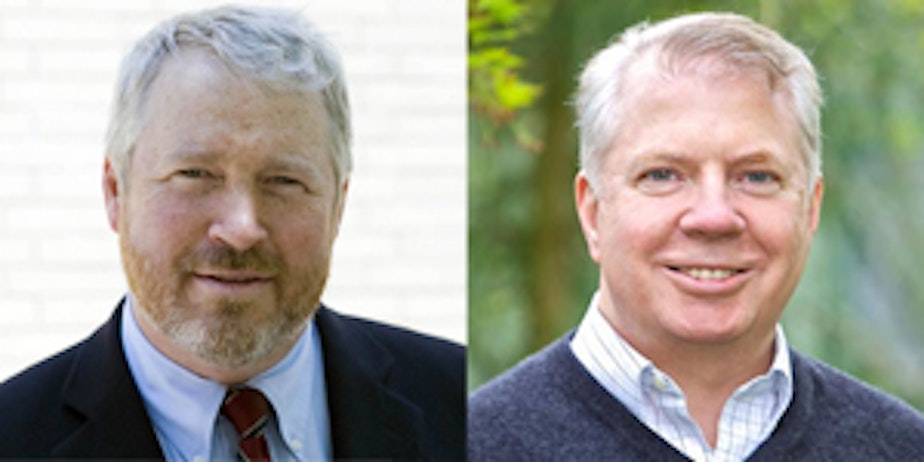Finding The Differences Between McGinn, Murray: This Interview Helps

The 2013 Seattle mayoral race has been rife with finger pointing, questions about leadership style and the source of campaign contributions. For the average voter, the debate may not include enough substantive conversation about the meat and potato issues that face Seattle citizens: How do we pay to fix our roadways? Where do we funnel new density? Are we as safe as possible in our homes and in public venues?
Incumbent Mayor Mike McGinn and his challenger, State Senator Ed Murray, are both self acknowledged political liberals. The Record’s Marcie Sillman interviewed the candidates separately to try to find out where they agree, and where their priorities for Seattle differ.
On Bikes And Transportation:
McGinn: “We’re one of five cities in the nation where majority of people don’t take single occupancy vehicles to work. One of only five. So that’s pretty amazing. We are trying to change the emphasis of our capital spending from huge highway mega projects to transit, walking, biking, local streets.”
Murray: “On bicycles alone, we have fallen behind other cities, in the number of people who are riding bicycles. I mean, Minneapolis is ahead of us now, and they have snow and ice."
Marcie Sillman to Murray: They’re also flat.
Murray: “They’re flat, yes. Hills would never stand in the way of Seattleites who want to bike. I don’t believe we’ve built a particularly safe system and I think that we have mixed often into situations where you’re stuck between a car door and a car and a bus.”
On Crime:
McGinn: “There are people who just don’t follow the rules. They get tickets and they don’t pay tickets. We’re working with our city attorney to responsibly prosecute those that just don’t follow the rules. Under his leadership, the city just stopped prosecuting those at all. We probably did too much prosecution of that in the past but now the pendulum has gone too far to where we’re doing not enough. And I think we need to do some.”
Murray: “We truly have a rise in crime in certain neighborhoods in certain types of crimes. That has led to a perception that can become a reality in people’s minds and can hurt our tourism industry and can hurt downtown when people in other neighborhoods are afraid to go downtown.”
Marcie Sillman to Murray: Do we need more policing? Is it as simple as that?
Murray: "We had an opportunity when the Obama justice department said, ‘You have a problem with how your police deal with race and how they deal with overuse of force.’ We have spent years under this mayor fighting the Justice Department. … We should have moved early and quickly and reformed the police department. We haven’t."
On The Open Police Chief Position:
Murray: “We need to do a national search. We need to identify someone who knows how to change the culture of a police force, who can restore the morale of the police force, which is not particularly high these days, and who can restore the faith of the citizens of the city in their police force.”
McGinn: The new chief has "to be innovated and creative. They have to be dedicated to harm reduction as a philosophy, not just law enforcement because so many of the challenges we face are social challenges. They have to have the trust and respect of the police officers as well as the community leaders. That’s a tall order."
Marcie Sillman: Would (Interim Chief Jim Pugel) keep the job until you’ve found Gandhi to fill his shoes, because that sounds like what you’re looking for?
McGinn: “Chief Pugel has indicated that he wants apply for the job. And so far he’s been scoring good marks with community leaders and the police officers and the monitors as well. So I think we’re fortunate to have Jim doing the work he’s doing right now, and I’m glad he’s going to apply, but of course we’re going to do a national search.”
On Neighborhoods:
Murray: "It’s been pretty much, since the Nickels administration, ‘Centralize downtown.’ I think we should come up with a 21st century version of what we were doing right in the 90s."
Murray: "Look at what Vancouver, British Columbia did. They decided the first thing they would do was to build out their pedestrian structure, to create connectivity throughout the city. I think if you start there, you get to what you want.”
Marcie Sillman to Murray: It’s an interesting comparison, because the Vancouver developers were required to pay for a lot of that infrastructure – they have very different laws about when somebody builds a big building, what that somebody has to provide.
Murray: "That’s right … I don’t think that’s a reason to step back."
Produced for the Web by KUOW's Isolde Raftery.
Tweets from Tuesday night's mayoral debate hosted by KCTS and co-moderated by KUOW's Deborah Wang:

